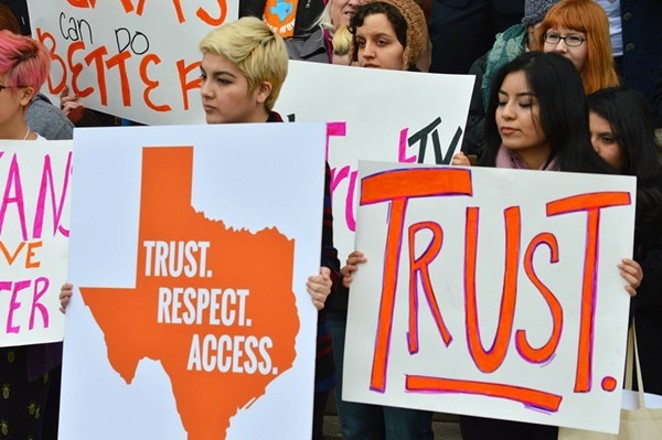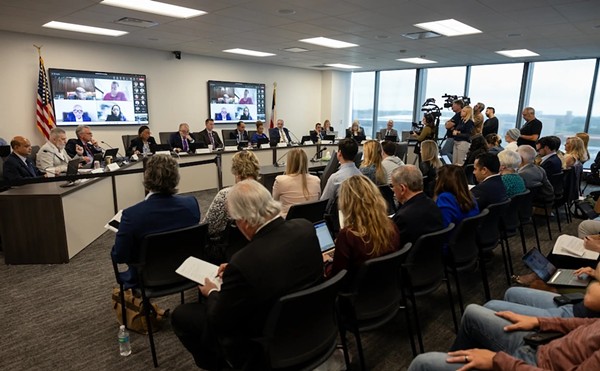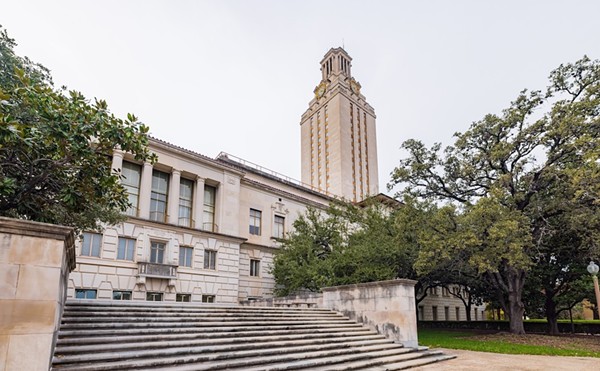Texas Is Conveniently Late Releasing Abortion Stats
By Michael Barajas on Fri, Jun 24, 2016 at 6:35 am
Next week the U.S. Supreme Court will decide whether the omnibus anti-abortion bill Texas lawmakers passed in 2013, which has shuttered dozens of abortion clinics across the state, constitutes an unconstitutional burden on a woman’s right to choose. The most important abortion rights case in decades, the High Court ruling could very well redefine what restrictions states are allowed to place on abortion providers. Should the Supremes rule in Texas’ favor, abortion could become practically inaccessible for women at the bottom rungs of the socioeconomic ladder.
When the case went before the court last March, one question dominated oral arguments: What actual impact did the law have on abortions in the state?
Last week the ACLU of Texas sent state officials a letter accusing them of sitting on data that could answer that question. In the letter to Texas Department of State Health Services Commissioner John Hellerstedt, ACLU of Texas attorney Trisha Trigilio alleges the department has been “concealing” stats that, according to one department insider, were ready for release as far back as March, around the time the case was argued at the Supreme Court.
“Since that time, upper-level supervisors within DSHS have instructed employees to mislead the public about whether these statistical tables are complete, and to refrain from sending email about the statistics in order to avoid creating a paper trail,” Trigilio wrote.
As Trigilio points out in her letter, the state’s abortion stats for 2014 are particularly important because they cover the first full year that HB2 was fully implemented across the state. In fact, what HB2 would actually do once completely rolled out has been at the heart of the debate over the law ever since lawmakers first proposed it in 2013. As the Legislature debated the bill, they heard from medical groups like the American Medical Association, the American College of Obstetrics and Gynecologists and the American Academy of Family Physicians, all of which said the law would actually endanger women. Lawmakers passed it anyway under the guise of women’s safety.
Not only did the federal district court judge who later heard the case cite a “dearth of credible evidence” that the law would make women any safer, but according to researchers that have been studying the law’s impact, there’s already evidence the law is actually harming women. For instance, researchers say that increased wait times at clinics that managed to keep their doors open have pushed more abortions into the second trimester, which increases health risks for women.
It appears a DSHS insider contacted the ACLU about the state’s abortion stats, frustrated that the department was dragging its feet despite the ongoing national debate about the impact of restrictive abortion laws like HB2. According to Trigilio’s letter, DSHS supervisors have even instructed employees to lie to people filing public information requests for the data.
In an email yesterday, DSHS spokeswoman Carrie Williams told us, “If the data were final, we would release it. The details are being reviewed for accuracy. We did release the provisional total several months ago but can’t release the underlying details until they are final." According to the department’s own provisional numbers, abortions dropped some 14 percent between 2013 and 2014.
However, yesterday the DSHS insider who tipped off the ACLU spoke to the Texas Tribune, saying the agency appears to be deliberately withholding data that could prove what abortion providers have been saying ever since HB2 passed – that there’s been a drop in every single type of abortion procedure, including a steep decline in medication abortions due to the law’s strict requirements.
All of which means we might not know the full consequences of Texas’ abortion law until well after it’s been debated and decided by the highest court in the land.
When the case went before the court last March, one question dominated oral arguments: What actual impact did the law have on abortions in the state?
Last week the ACLU of Texas sent state officials a letter accusing them of sitting on data that could answer that question. In the letter to Texas Department of State Health Services Commissioner John Hellerstedt, ACLU of Texas attorney Trisha Trigilio alleges the department has been “concealing” stats that, according to one department insider, were ready for release as far back as March, around the time the case was argued at the Supreme Court.
“Since that time, upper-level supervisors within DSHS have instructed employees to mislead the public about whether these statistical tables are complete, and to refrain from sending email about the statistics in order to avoid creating a paper trail,” Trigilio wrote.
As Trigilio points out in her letter, the state’s abortion stats for 2014 are particularly important because they cover the first full year that HB2 was fully implemented across the state. In fact, what HB2 would actually do once completely rolled out has been at the heart of the debate over the law ever since lawmakers first proposed it in 2013. As the Legislature debated the bill, they heard from medical groups like the American Medical Association, the American College of Obstetrics and Gynecologists and the American Academy of Family Physicians, all of which said the law would actually endanger women. Lawmakers passed it anyway under the guise of women’s safety.
Not only did the federal district court judge who later heard the case cite a “dearth of credible evidence” that the law would make women any safer, but according to researchers that have been studying the law’s impact, there’s already evidence the law is actually harming women. For instance, researchers say that increased wait times at clinics that managed to keep their doors open have pushed more abortions into the second trimester, which increases health risks for women.
It appears a DSHS insider contacted the ACLU about the state’s abortion stats, frustrated that the department was dragging its feet despite the ongoing national debate about the impact of restrictive abortion laws like HB2. According to Trigilio’s letter, DSHS supervisors have even instructed employees to lie to people filing public information requests for the data.
In an email yesterday, DSHS spokeswoman Carrie Williams told us, “If the data were final, we would release it. The details are being reviewed for accuracy. We did release the provisional total several months ago but can’t release the underlying details until they are final." According to the department’s own provisional numbers, abortions dropped some 14 percent between 2013 and 2014.
However, yesterday the DSHS insider who tipped off the ACLU spoke to the Texas Tribune, saying the agency appears to be deliberately withholding data that could prove what abortion providers have been saying ever since HB2 passed – that there’s been a drop in every single type of abortion procedure, including a steep decline in medication abortions due to the law’s strict requirements.
All of which means we might not know the full consequences of Texas’ abortion law until well after it’s been debated and decided by the highest court in the land.

KEEP SA CURRENT!
Since 1986, the SA Current has served as the free, independent voice of San Antonio, and we want to keep it that way.
Becoming an SA Current Supporter for as little as $5 a month allows us to continue offering readers access to our coverage of local news, food, nightlife, events, and culture with no paywalls.
Scroll to read more San Antonio News articles
Newsletters
Join SA Current Newsletters
Subscribe now to get the latest news delivered right to your inbox.


















